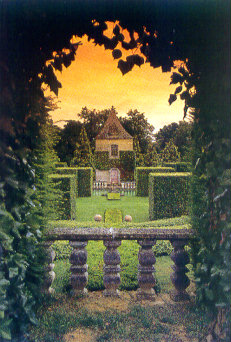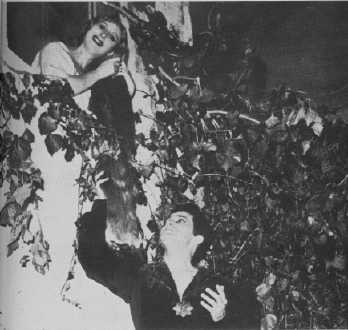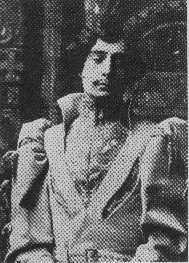Act II
MS: She has now.... She's so much in his confidence, you see, that he dares to
show hirn` his hide-out.
DC: His secret, his secret hiding place.
MS: His hide-out, you see.
DC: How old is Pelldas?
MS: Well, no, it's a question.
I would say his very, very early 20's, 21, 22 at least. And
she, nobody knows.
DC: No, no.
 MS: And she has this mysterious advantage that she never delivers, surrends`
anything of herself. And here, for the moment, he surrenders himself, you see.
This is the place where he comes. Nobody is ever coming there. You see, there
is a certain legend about the place and "Vous ne savez pas où je vous ai
menée? - Je viens souvent m'asseoir i¸i,
vers midi, lorsqu'il fait trop chaud dans les jardins. On étouffe,
aujourd'hui"
MS: And she has this mysterious advantage that she never delivers, surrends`
anything of herself. And here, for the moment, he surrenders himself, you see.
This is the place where he comes. Nobody is ever coming there. You see, there
is a certain legend about the place and "Vous ne savez pas où je vous ai
menée? - Je viens souvent m'asseoir i¸i,
vers midi, lorsqu'il fait trop chaud dans les jardins. On étouffe,
aujourd'hui"
"...p. 56..."
MS: I would make the liaison.
DC: pas / où?
MS: Yes, you see, the laws of liaison are extremely vague in
France. But when it is in poetic declamation, I like that. "Yous ne savez pas /
où je vous ai menée?" so that there is no interruption, not the
slightest interruption in the flow of the, of the voice. In speaking, we don't
do that.
 DC: pas / où.
DC: pas / où.
MS: Je ne sais pas où nous allons.
DC: One measure.
"...p. 56-60..."
MS: There you are. I think what you should do is to show me the places where you
are having trouble.
DC: I want to go through the whole thing. I want to receive all your thoughts, if
you don't
mind.
MS: But there are very few thoughts! I generally agree with what you
do.
What I want is to, that you have constantly in mind the... a
certain idea of lightness.
DC: Well,...
MS: You will be heard. Your voice is an excellent voice
with an excellent vibration and you don't need to worry, not against this
orchestration, you see. And beside(s), you see,
through many, doing many, many varied things, some of them I should never have
done,
I have learned that there is a way of tuning your voice to the need of the
moment. You
don't have to have a general fear that your voice is not going to be heard. There
are
many places where you are to be not only excellent musician but a very clever
person, excuse me, I speak professionally at the moment. You should make a
discrimination between all the pages, you sing, those in which you can have some
desire
to make your voice a little stronger because you will not be heard and those we
can,
should sing exactly with your most ravishing timbre and forget about the
orchestra. You
will never be covered in this.
 DC. Well,...
DC. Well,...
IB: I don't think so. Let's... we'll leaf through and maybe you'll find
some spots.
MS: Yes.
IB: What we just did is fine. And these... "Ne vous penchez pas airs!"
That's OK.
MS: Let's see how you do those little phrases.
DC: You pick. You be the... You decide what you want me to sing.
MS: No. If you have...
DC: The Tower Scene.
MS: How much time do we have?
IB: Well, we have...
MS: ...this week?
IB: Oh, we can have another hour whenever you say.
MS: Oh.
IB: ...but we stop at 3:00 today, because of...
MS: Let's do this first one.
IB: Right. OK. Let's see, we did "n'entre jamals".
"...p. 60..."
MS: Excuse me. What I like now is you start opening the open vowels at the
end of the
phrase. At the beginning, you were always... "lique la mer"...and this will
be
heard anywhere. "Elle est peut-être aussi profonde que la mer." Right
here." No
pressure of any kind... "que la mer."
"...p. 60..."
"Ne vous penchez pas ainsi." "Ne vous penchez pas ainsi." Yes.
"...p. 61-62..."
It's excellent. It's excellent. When you have very short
notes, like the "Oh! oh!". Try to sing them so they have a spin. "Oh! oh!"...
if it makes sense.
DC: Sing them.
MS: Yes, with a kind of spin. Spin this way. They are
not "Oh, oh." They gain in worth as short as they are.
 "...p. 62-63..."
"...p. 62-63..."
Yes, in ecstasy. "Vos cheveux ont plongé dans I'eau-".
IB: Yes. He'll wait for you.
"...p. 63..."
MS: And now, inquisition.
"...p. 63..."
Fine. Now: here, that's up to you. I don't know. This inquisition could become
a little bit...
DC. Distant?
MS: No, no, no. At the end, a little... a little harder. You see "Et vous ne
vouliez pas? Pourquoi ne vouliez-vous pas?" She escapes.
DC: Yes. She skips the subject.
MS: But because you become a little more intense.
DC: I see.
"...p. 64..."
MS: In your mind, you have the idea: maybe he was embracing her. "tail-ii tout
pr~-s de vous?" "Oul; il voulait m'embrasser..." which is a lie.
DC: Yes.
MS: "Et vous ne vouliez pas?" "Non." Pourquoi ne vouliez-vous pas?" "Oh!
oh!"
"proFONde." Feed it.
"...p. 66-67..."
Now, when you have a succession of those high notes, think
of more slimness. "Ne le jétez pas si haut vers le ciel!" Don't open
"ciel". A little nearer to é. See? You know, you have so much more ease
with the high notes than I had. I had to take such a constant care of myself to
be sure I was not going to miss.
 DC: How old were you when you started singing Pelléas?
Your first one.
DC: How old were you when you started singing Pelléas?
Your first one.
MS: My first time at the Metropolitan, I was 38.
DC: That was your first Pelléas?
MS: I had never sung Pelléas before.
DC When you were 38.
MS: You see, that was the big idea of Edward Johnson. He
had engaged me for singing Pelléas. Of all things, he had heard me singing
Wolfram in Paris. And having heard me singing Wolfram, he decided that I would
be the ideal Pelléas. He had been the only Pelléas
before.
DC: Right. He was the first Met Pelléas.
MS: Yes. And the only.
DC: Yes, until then.
MS: Yes. So: when he had this idea (and it was, it would
have been only part of my contract) as it had been the wartime. As it was the
wartime and it was a condition, I was a refugee. I had fled my country and I
had nothing and the family.... and so he imposed upon me to sing Pelléas.
And then I had to do it. It was that or dying; die. You see? And then I had
to find a way. But I found a way to the high notes constantly through
this strange idea which I teach to this day, with ------- some remarkable
results: that the high notes are not brought here (gesturing to the
top/back of the head). They are still starting from here (between the
lips and the nose). After they have ascended along the face, THEN they
expand.
 DC: First, here.
DC: First, here.
MS: But just along the face; not into. Along. You know,
the word of Jean de Reszke "dans le masque" means in French - we have only one
word for dans;for inside, into and in, we have only dans. And everybody
translated it "in".
DC: In, within.
MS: Yes. Within. I have manuscript notes taken by
students of his, of his, when he was teaching... and it's "along the masque".
And try to get that for the high notes. You see, "Ne le jétez pas si haut
vers le ciel!"
DC: (In agreement) But if you keep doing it, it eliminates
the top. You can't bring that... you can't carry that darkness that I do up to
the top.
MS: No. No. Did you understand what I'm trying to do?
DC: Yes. Totally, totally.
MS: I have practically no voice today whatsoever, but "vers le
ciel!"
Provide an ascension and then you can open in the
back.
 "ciel!"
"ciel!"
"...p. 67..."
Yes. That's a typical french voice.
DC: Baryton-martin?
MS: Baryton-martin. OK. Is that
difficult?
DC: No.
MS: Maybe this will help you with the very high
places.
DC: The tower scene.
MS: Yes. Oh, I had such a... such a... with the Tower
Scene.
 DC: Shall we skip to the Tower Scene?
DC: Shall we skip to the Tower Scene?
IB: Anything else here you want to work on?
"...p. 72..."
MS: You see, it stays along the nose. It doesn't enter,
but it's not away either. I said the vibration of the voice is, when one sings
this kind of music, is something which stays constantly 1 millimeter from
touching the front; but it doesn't touch the front. It'sgmillimeter from the
front. Then it goes up and resounds.
IB: Donald, now what about this grotto scene where you're so
low. Is that any problem?
DC: Let's do it, let's...
IB: You want to do that? Let's do just a little bit.
"...p. 105..."
MS: If something bothers you, sing that entirely in the
mouth. "Il fait si noir que I'entrée de la grotte ne se distingue plus du
reste de la nuit..." That's where we have our low notes. That's where I was
able to sing the Verdi Requiem and b minor Mass and everything, you see. Il fait
si noir que I'entrée de la grotte ne se distingue plus du reste de la
nuit..."
 "...p. 105-106..."
"...p. 105-106..."
The difficulty of that is that this is the right tempo - you're absolutely right
- and nevertheless, it must give the impression of quietness.
DC: Calm.
MS: Yes.
DC: And he's... he's trying to make sure that she's not frightened.
MS: "Il fait si noir que I'entrée de la grotte ne se distingue plus du
reste de la nuit..."
DC: Extremely legato.
MS: Extremely legato and maybe the legato will give the impression of
quietness. The tempo is absolutely right.
IB: There's a danger of being too fast. Then you can't get it out.
"...p. 10g-108..."
MS: You do it extremely well. You see, you have come already a little ways
since the beginning of this hour towards the brightness. You see, and getting
your...
I don't know whether you know the phrase of Lamperti, that
there is a trio of divinities, that is the tip of the tongue, the teeth and the
lips.
 DC: The tip of the tongue, the teeth and the lips.
DC: The tip of the tongue, the teeth and the lips.
MS: You know of Lamperti?
DC: Yes.
MS: Well, he would not be in fashion with singers. So, this is... we must
find a way 'Entrons-
y." Not "Il faut pouvoir décrire I'endroit où vous avez perdu
la bague, s'iI vous
interroge..."
DC: Be careful...
MS: 'Elle est trés grande et trés belies."
DC: Now he describes to her...
MS: But, (he) is asking her "Why are we here?" The next is also more
candid. Slight
difference in color on the top.
"...p. 106..."
"comme le ciel."
Retain this idea: start an ascension prior to an
amplification; and then
amplify. In many places, you see, what I want... I have the impression that
sometimes at
the end of the phrase you yield to the... to the simple desire (because that's
the way you
have sung which is fine) to have a little... This will not apply here. "comme
le ciel."
DC: Keep it...
MS No:
 ascend. And when it seems that the tone has reached a
certain height, then you amplify. "ciel."
ascend. And when it seems that the tone has reached a
certain height, then you amplify. "ciel."
DC: Connect it here first.
MS: Yes, yes. But I mean it here. Not here. Here. "ciel."
"...p. 108..."
That's the only place where you are an American. "une petite lumiere,"
DC: What did I say?
MS: "petite lumiere". Just the tip of the tongue in the back of the front
teeth.
"...p. 108-110..."
You are excellent. Here, I will let you have a tip in case you need it.
DC: Please.
MS: When you have an attack,... I... I hate... I hate the word "attack". If
you attack a note, then...
IB: We kill it.
MS: Yes.
Continue to Act III
Return to the only
opera
Go to Ope-ra
Go back to the HomePage
 DC: pas / où.
DC: pas / où. DC. Well,...
DC. Well,... DC: First, here.
DC: First, here.